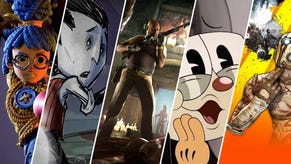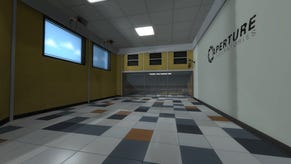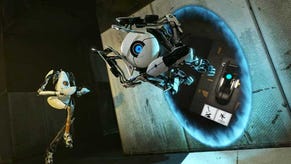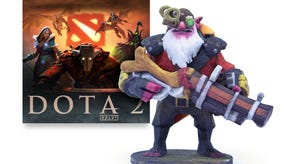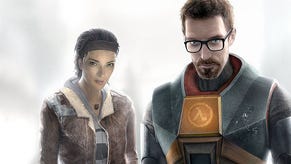The Weekly Wrap – Nintendo's next, Portal 2, DRM
We're dedicating this week to Jade Empire 2. Goodnight, sweet prince. Here's some other things that happened this week as well.
NintenGO: E3 for next hardware, power boost over PS360
What happened: The rumor mill went into Giga-Splosion Overdrive Maximum Limit after Game Informer claimed that Nintendo's next console is gunning for an E3 reveal. The major takeaways? It'll be HD (Michael Pachter is quantifiably the happiest man on earth right now), have a slight graphical advantage over Xbox 360 or PS3, and its controller will have a touch screen.
What it means: Nintendo's far from finished marching to the beat of its own drum, and who can blame it? More than 80 million units sold is pretty tall order to argue against. As always, though, the question remains: have Miyamoto and his merry band of Fun-gineers finally gone off the deep end? Tough to say. If the most recent information is reliable (and given how conflicting some reports have been, even that's a stretch), then the basic concept doesn't sound that far-removed from the Wii. Graphics that'll probably end up a few years behind the curve when the next-gen dust settles? Check. Zany, unproven control method that'll give folks weaned on sticks, buttons, and unironic discussions of the word “ergonomics” fits? Check. The devil's in the details, however, and – again, if they're true – that's where things get interesting. For one, Microsoft and Sony's next consoles could very well still be napkin doodles or especially creative uses of macaroni and glue. If that's the case, Nintendo might be looking at a little time atop the graphical heap – provided the world doesn't collapse in on itself from the sheer ludicrousness of the idea. Meanwhile, the thought of a touch screen controller presents hugely interesting possibilities, but we don't know enough about it yet. Will it function as a separate device as well? Will it primarily allow for variable control schemes, or are we essentially looking at a giant Nintendo DS with equally involved gameplay on both screens? Like helpless baby birds, we hunger for knowledge. Someone, chew this stuff up and vomit it into our mouths already.

Lend your CPU to GLaDOS by playing Potato Sack games
What happened: Valve used its strange, wiki-spawning Potato Sack ARG to play gamers like easily excitable fiddles. “A countdown clock? That's got to be for an early Portal 2 release,” everyone figured. Close, but no. Turns out, there's one little speed bump – or rather, 13 of them. Your task, then, is simple enough: play a bunch of excellent indie games and Portal 2 will be yours before you know it.
What it means: It's almost stunning how love-or-hate gamers' reactions to this whole thing have been. In one camp, you have the “All hail St. Newell, promoter of indies and lover of excellent shampoo based on the hair I stole from his garbage for my totally platonic love shrine” group, and in the other, the ARG's been declared a hostage situation. “You won't let me play the game unless I spend even more money?” they cry. “Valve is the new Electronic Activision Microsoft Arcade Fire!” We, however, tend more toward the middle. Yes, at the end of the day, this is a marketing ploy. Even Valve – when it's not crusading for puppy-orphan-who's-never-been-hugged rights – looks out for itself first and foremost. Even so, there are far worse ways to promote your game than giving exposure to highly deserving indies. Also, it's not like Valve is forcing you to fork over extra cash. Worse comes to worst, Portal 2 will simply launch on time. A shocking concept, we know.
Capcom's Dragon's Dogma getting medieval in early 2012
What happened: Captivate happened, and it happened hard. Street Fighter X Tekken, Dead Rising: Off the Record, Resident Evil: Raccoon City, and Asura's Wrath all made strong showings. Also, holy s**t, Dragon's Dogma.
What it means: We really, really like what Capcom's been up to lately. It's the only Japanese developer we can think of that's making an appeal to Western audiences while maintaining a unique identity. No ham-fisted attempts at bald space marine shenanigans or whatever else marketing surveys say we like. Instead, Capcom's leveraging Western developers for fresh spins on old favorites and mixing in some incredibly promising new IP of its own. On top of that, the publisher's also been fairly forward-thinking with its business model, making smart use of outside-the-box ideas like Dead Rising: Case Zero to huge success. Japanese game development may be struggling at the moment, but if anyone's doing it right, it's Capcom. Here's hoping the rest of the scene decides to follow in its footsteps.

Good Old Games: DRM's effectiveness "close-to-none," often causes piracy
What happened: Ever notice how some weeks/days/milliseconds have an unintentional theme? Well, this week's was DRM. First, Dragon Age's DRM servers let out a whimper and promptly died, resulting in some especially harsh criticism of EA and BioWare's handling of the situation. Then Good Old Games poked hole-after-hole in the current methodology behind DRM, noting that piracy is generally more appealing for all involved. And lastly, Garry Newman whipped up an “I Can Believe It's Not DRM” alternative that doesn't, you know, target legitimate customers almost exclusively.
What it means: Take a step back and just look at that. It's beautiful, isn't it? A perfect snapshot of the DRM situation as we know it. Consumers suffering, companies not noticing because they're run entirely by sightless mole people (or, you know, they're in denial), and a tiny minority actually trying to do the right thing. Big publishers, seriously, cut the crap. It's frankly incredible that you still haven't sliced out this giant, ugly wart on your business. Don't get us wrong: piracy is a problem – and a big one at that. Here's an idea, though: take some pointers from Garry's Mod and do something that actually works for a change.

Sony and Hotz agree out of court - full settlement details
What happened: And just like that, it was over. No life-devouring legal wars of attrition, no round-the-clock-coverage, no inspiring stories of the little guy triumphing over a big, greedy business. No bang. Just a quick out-of-court settlement before things got really ugly. Geohot's off the hook so long as he agrees to Sony's terms. The end.
What it means: Well, ok, not really. One way or another, this whole brouhaha will have a ripple effect for years. Obviously, giving one guy a firm slap on the wrist isn't going to make the entire jailbreaking scene say, “Sirs, we have been honorably defeated. We hereby lay down our keyboards and offer up sacrifices of delicious food, our hobby, and our rights.” The question, however, is what happens next. Some speculate that hackers will be more hesitant to do their thing over in Console Land. To us, though, the jailbreaking community – especially in light of its fervent support of Geohot (regardless of the ultimate consequences) – doesn't seem like the type to roll over so easily. Our guess? Jailbreakers will come up with better, smarter methods. Another point of interest: Sony called off the war with startling speed. The console-maker may have acted as though it was shrugging off verbal attacks like a tank in the middle of a children's dodgeball game, but it knew a PR nightmare when it saw one.



